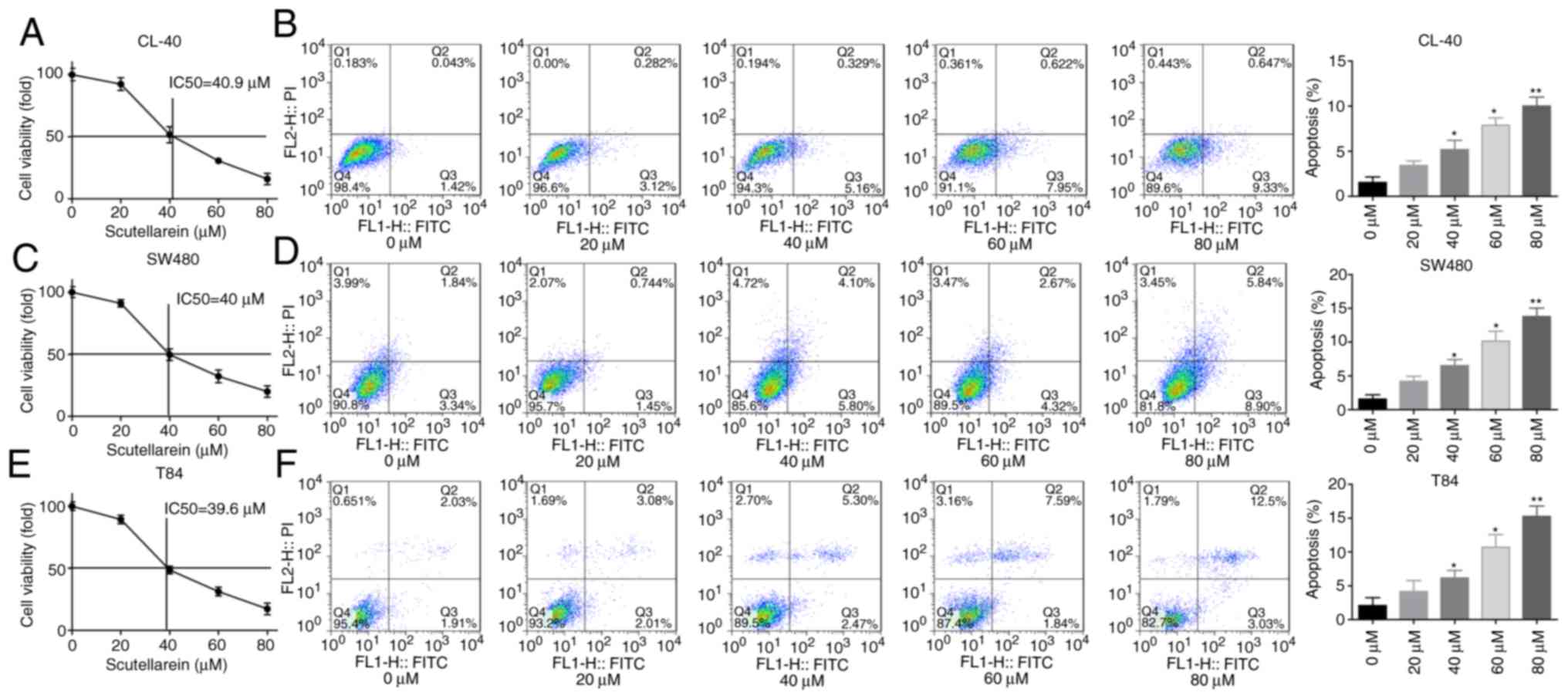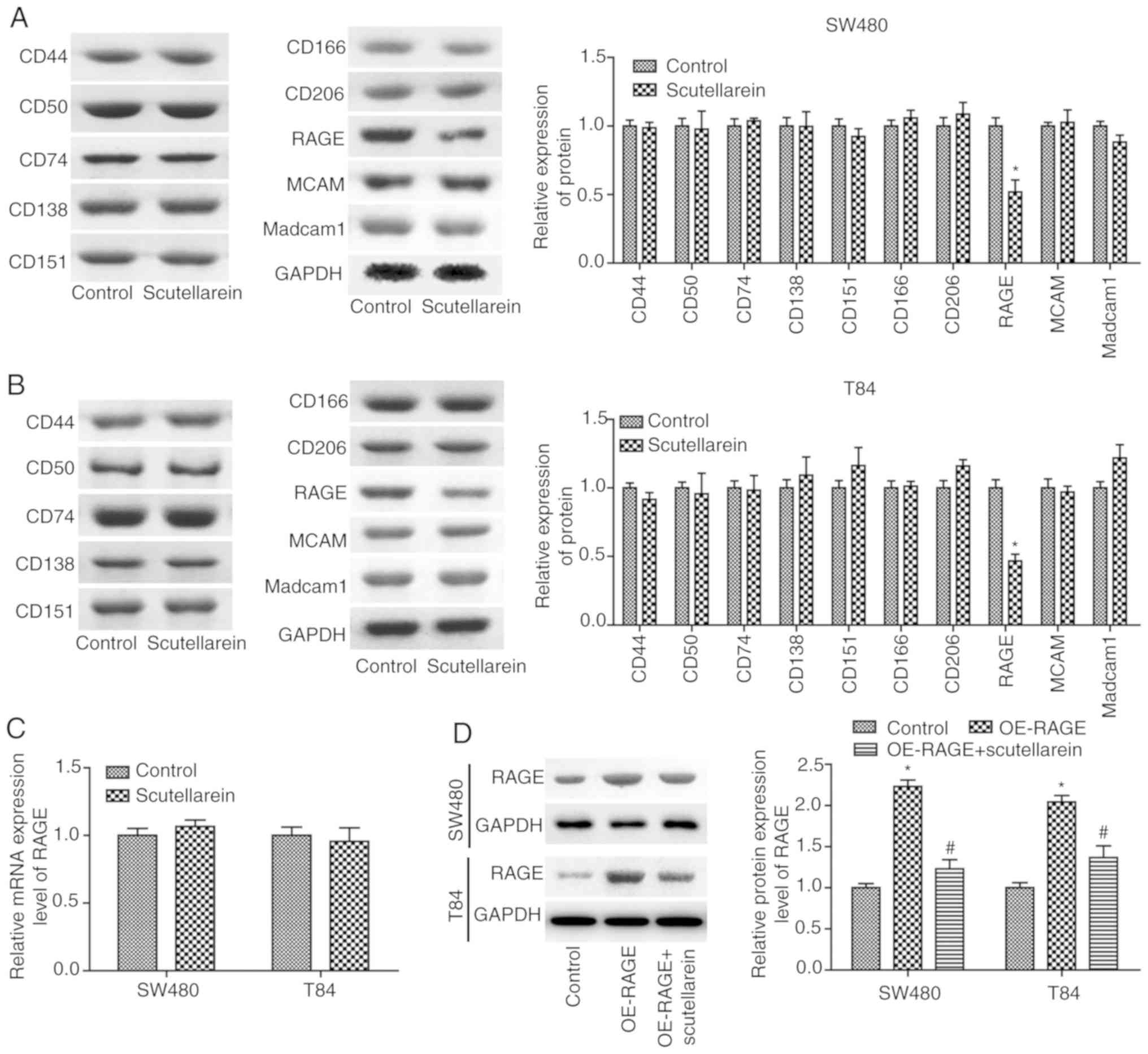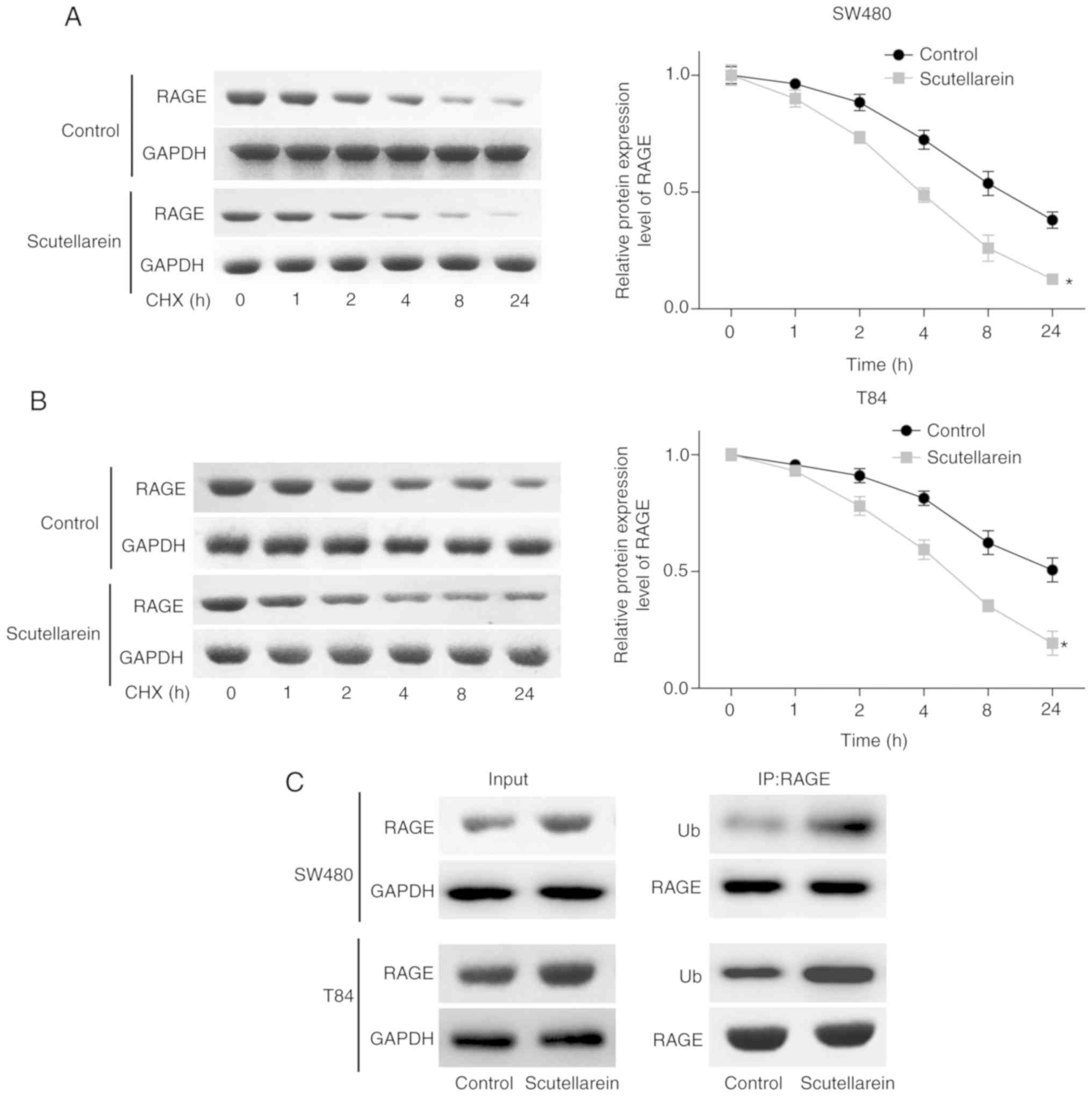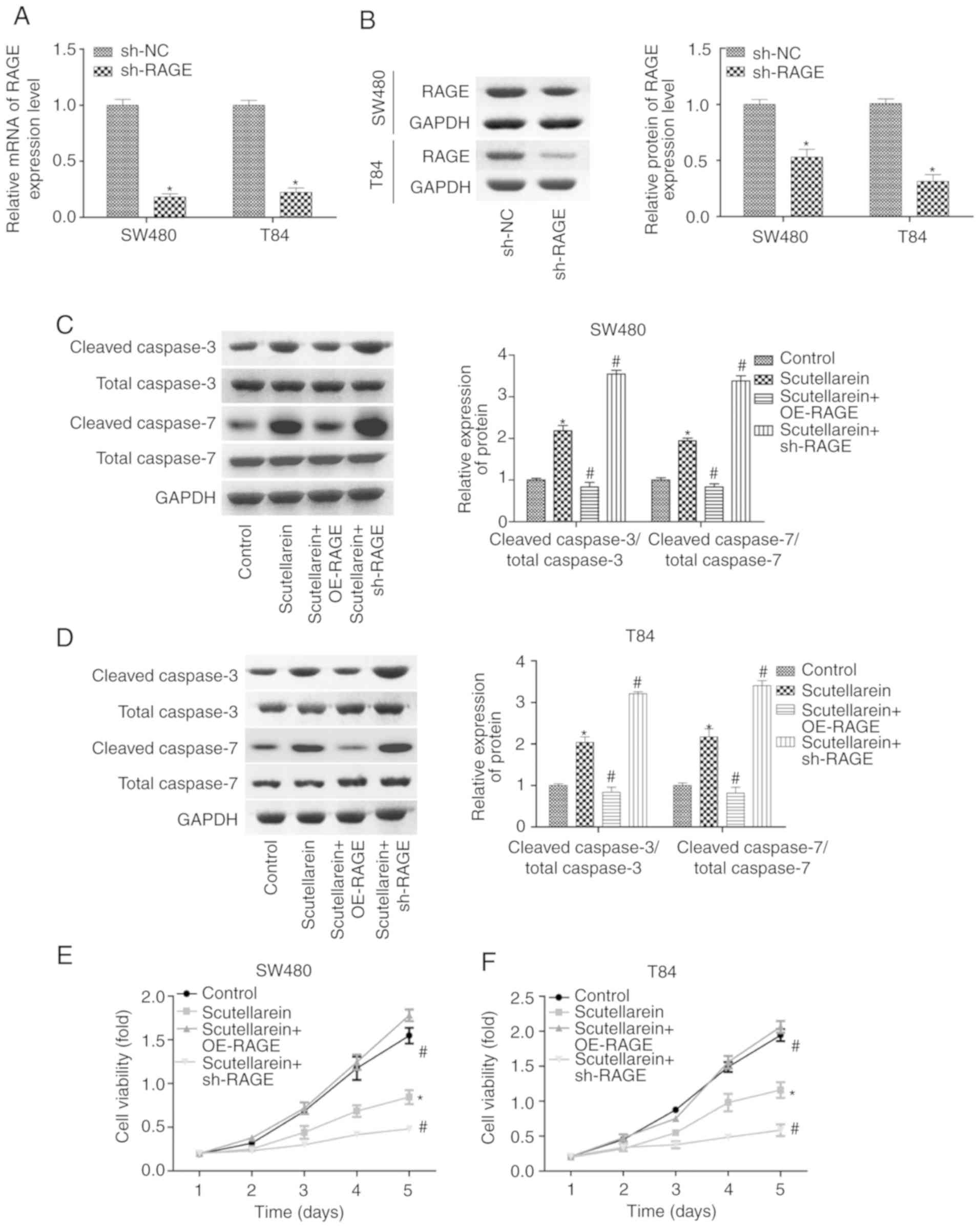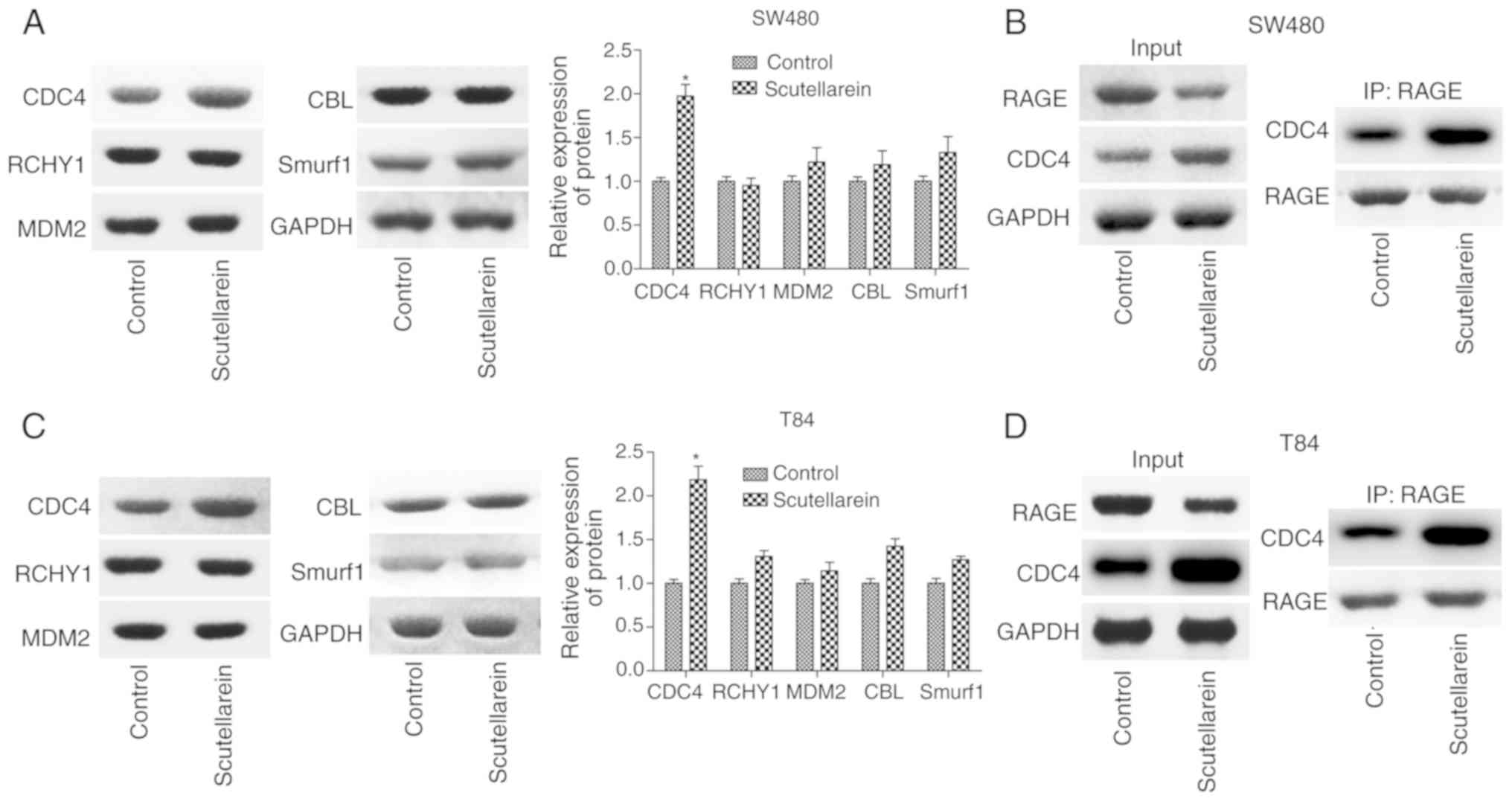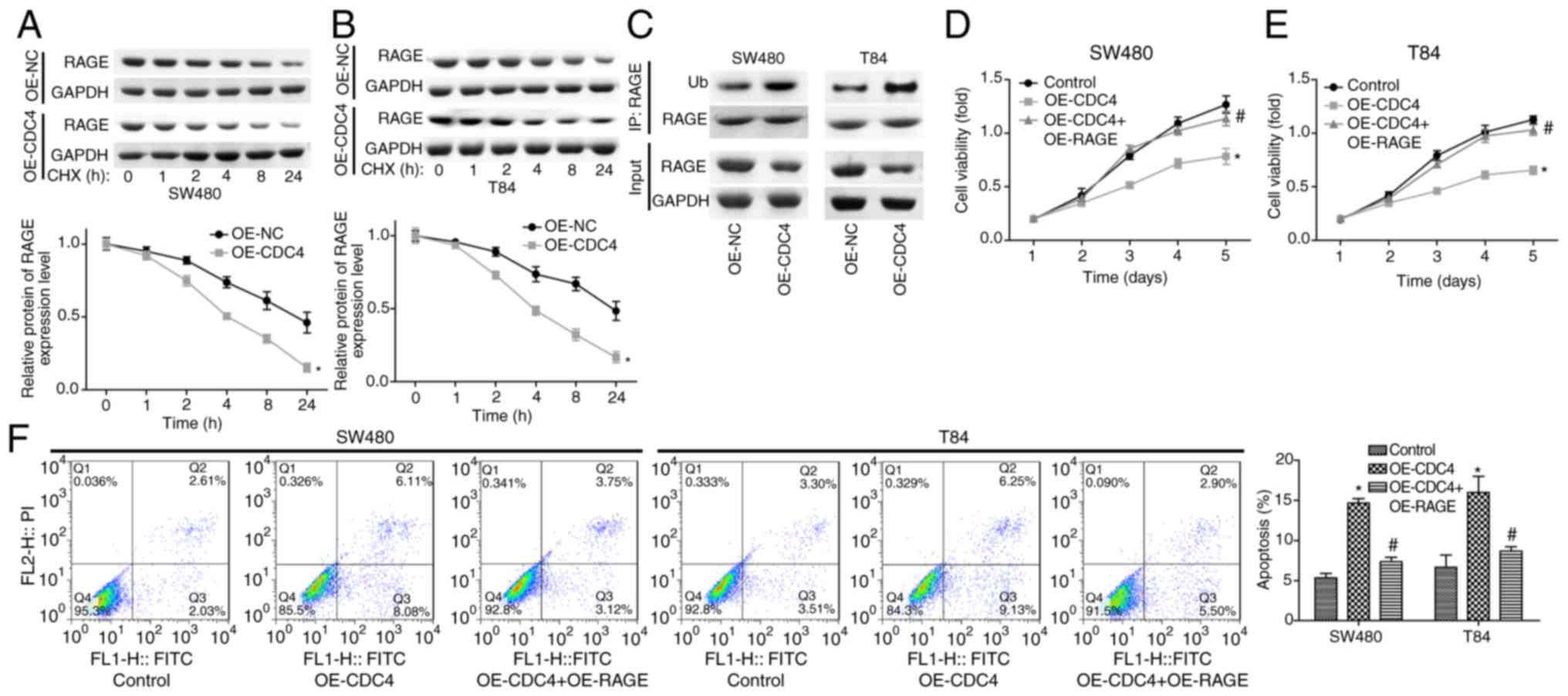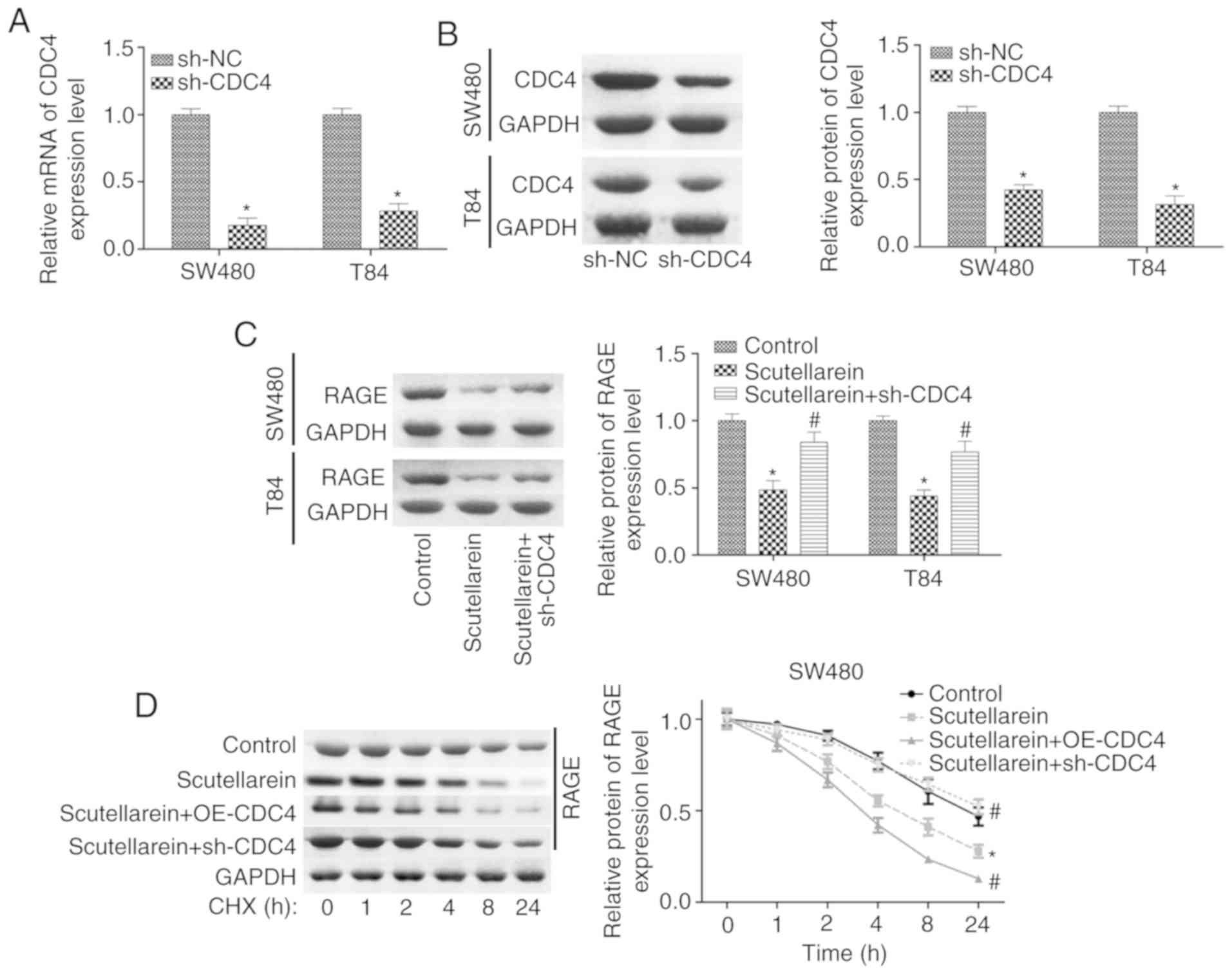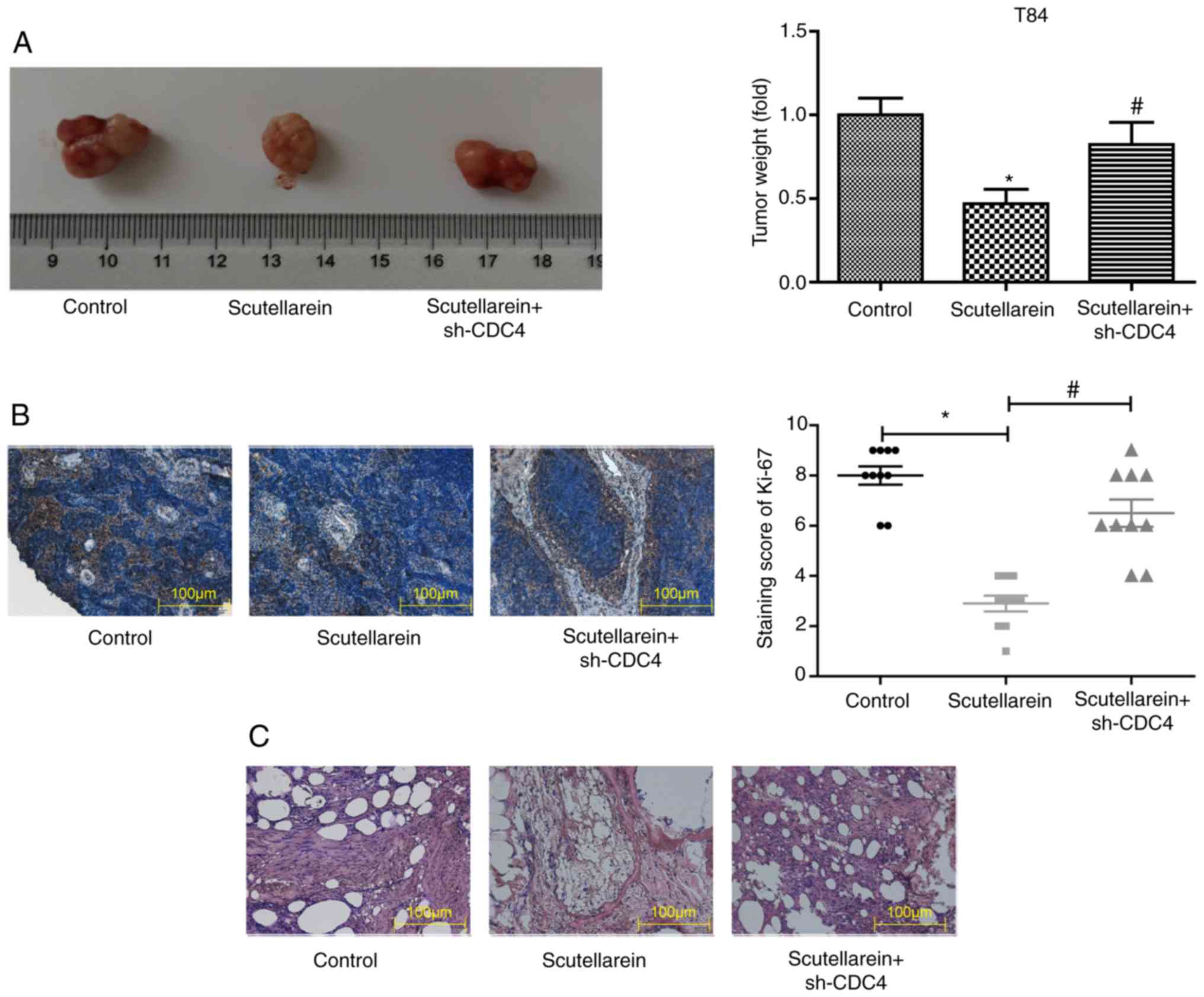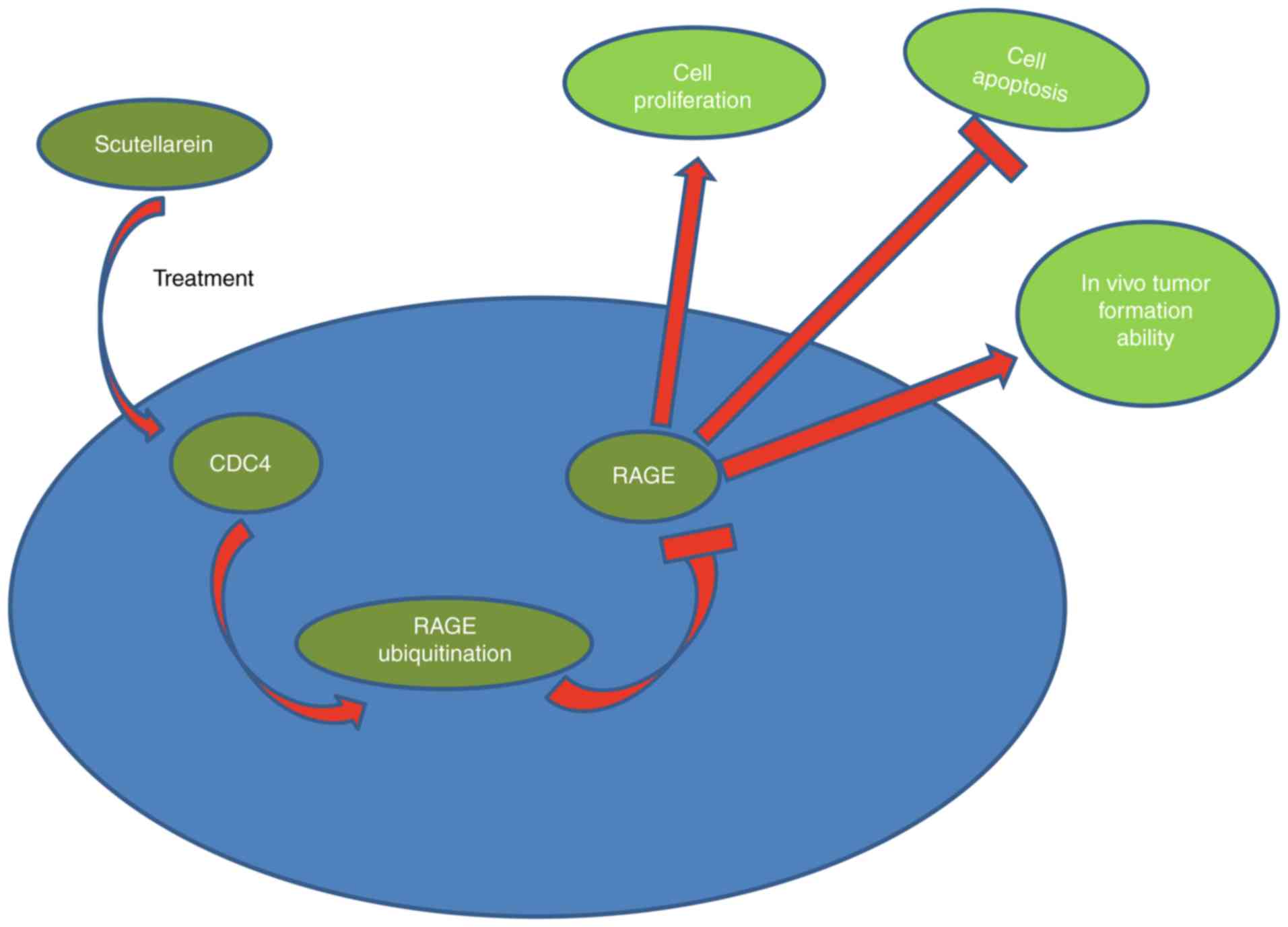|
1
|
Labianca R, Beretta GD, Kildani B, Milesi
L, Merlin F, Mosconi S, Pessi MA, Prochilo T, Quadri A, Gatta G, et
al: Colon cancer. Crit Rev Oncol Hematol. 74:106–133. 2010.
View Article : Google Scholar : PubMed/NCBI
|
|
2
|
Freeman HJ: Early stage colon cancer.
World J Gastroenterol. 19:8468–8473. 2013. View Article : Google Scholar :
|
|
3
|
Orangio GR: The economics of colon cancer.
Surg Oncol Clin N Am. 27:327–347. 2018. View Article : Google Scholar : PubMed/NCBI
|
|
4
|
Zhang Y, Shi J, Huang H, Ren J, Li N and
Dai M: Burden of colorectal cancer in China. Zhonghua Liu Xing Bing
Xue Za Zhi. 36:709–714. 2015.In Chinese. PubMed/NCBI
|
|
5
|
Sun S, Jiang P, Su W, Xiang Y, Li J, Zeng
L and Yang S: Wild chrysanthemum extract prevents UVB
radiation-induced acute cell death and photoaging. Cytotechnology.
68:229–240. 2016. View Article : Google Scholar :
|
|
6
|
Yang WS, Kim D, Yi YS, Kim JH, Jeong HY,
Hwang K, Kim JH, Park J and Cho JY: AKT-targeted anti-inflammatory
activity of the methanol extract of Chrysanthemum indicum var.
albescens J Ethnopharmacol. 201:82–90. 2017. View Article : Google Scholar
|
|
7
|
Deng Y, Jiang J, Chen S, Teng N, Song A,
Guan Z, Fang W and Chen F: Combination of multiple resistance
traits from wild relative species in Chrysanthemum via trigeneric
hybridization. PLoS One. 7:302012. View Article : Google Scholar
|
|
8
|
Hassanpouraghdam MB: Flowerhead volatile
oil composition of soilless culture-grown Chrysanthemum balsamita
L. Nat Prod Res. 23:672–677. 2009. View Article : Google Scholar : PubMed/NCBI
|
|
9
|
Shi X, Chen G and Liu X, Qiu Y, Yang S,
Zhang Y, Fang X, Zhang C and Liu X: Scutellarein inhibits cancer
cell metastasis in vitro and attenuates the development of
fibrosarcom in vivo. Int J Mol Med. 35:31–38. 2015. View Article : Google Scholar
|
|
10
|
Cheng CY, Hu CC, Yang HJ, Lee MC and Kao
ES: Inhibitory effects of scutellarein on proliferation of human
lung cancer A549 cells through ERK and NFκB mediated by the EGFR
pathway. Chin J Physiol. 57:182–187. 2014. View Article : Google Scholar : PubMed/NCBI
|
|
11
|
Parajuli P, Joshee N, Rimando AM, Mittal S
and Yadav AK: In vitro antitumor mechanisms of various Scutellaria
extracts and constituent flavonoids. Planta Med. 75:41–48. 2009.
View Article : Google Scholar
|
|
12
|
Guo F, Yang F and Zhu YH: Scutellarein
from Scutellaria barbata induces apoptosis of human colon cancer
HCT116 cells through the ROS-mediated mitochondria-dependent
pathway. Nat Prod Res. 33:2372–2375. 2019. View Article : Google Scholar
|
|
13
|
Goh D, Lee YH and Ong ES: Inhibitory
effects of a chemically standardized extract from Scutellaria
barbata in human colon cancer cell lines, LoVo. J Agric Food Chem.
53:8197–8204. 2005. View Article : Google Scholar : PubMed/NCBI
|
|
14
|
Behzad MM, Asnafi AA, Jaseb K, Jalali Far
MA and Saki N: Expression of CD markers' in immune thrombocytopenic
purpura: Prognostic approaches. APMIS. 125:1042–1055. 2017.
View Article : Google Scholar : PubMed/NCBI
|
|
15
|
Bacher P and Scheffold A: Flow-cytometric
analysis of rare antigen-specific T cells. Cytometry A. 83:692–701.
2013. View Article : Google Scholar : PubMed/NCBI
|
|
16
|
Tripathi SC, Fahrmann JF, Celiktas M,
Aguilar M, Marini KD, Jolly MK, Katayama H, Wang H, Murage EN,
Dennison JB, et al: MCAM mediates chemoresistance in small-cell
lung cancer via the PI3K/AKT/SOX2 signaling pathway. Cancer Res.
77:4414–4425. 2017. View Article : Google Scholar : PubMed/NCBI
|
|
17
|
Wang Z and Yan X: CD146, a
multi-functional molecule beyond adhesion. Cancer Lett.
330:150–162. 2013. View Article : Google Scholar
|
|
18
|
Zhang H, Zhang J, Wang Z, Lu D, Feng J,
Yang D, Chen X and Yan X: CD146 is a potential marker for the
diagnosis of malignancy in cervical and endometrial cancer. Oncol
Lett. 5:1189–1194. 2013. View Article : Google Scholar : PubMed/NCBI
|
|
19
|
Tanida S, Mizoshita T, Mizushima T, Sasaki
M, Shimura T, Kamiya T, Kataoka H and Joh T: Involvement of
oxidative stress and mucosal addressin cell adhesion molecule-1
(MAdCAM-1) in inflammatory bowel disease. J Clin Biochem Nutr.
48:112–116. 2011. View Article : Google Scholar : PubMed/NCBI
|
|
20
|
Truffi M, Colombo M, Peñaranda-Avila J,
Sorrentino L, Colombo F, Monieri M, Collico V, Zerbi P, Longhi E,
Allevi R, et al: Nano-targeting of mucosal addressin cell adhesion
molecule-1 identifies bowel inflammation foci in murine model.
Nanomedicine (Lond). 12:1547–1560. 2017. View Article : Google Scholar
|
|
21
|
Logsdon CD, Fuentes MK, Huang EH and
Arumugam T: RAGE and RAGE ligands in cancer. Curr Mol Med.
7:777–789. 2007. View Article : Google Scholar
|
|
22
|
Palanissami G and Paul SFD: RAGE and Its
ligands: Molecular interplay between glycation, inflammation, and
hallmarks of cancer-a review. Horm Cancer. 9:295–325. 2018.
View Article : Google Scholar : PubMed/NCBI
|
|
23
|
Fuentes MK, Nigavekar SS, Arumugam T,
Logsdon CD, Schmidt AM, Park JC and Huang EH: RAGE activation by
S100P in colon cancer stimulates growth, migration, and cell
signaling pathways. Dis Colon Rectum. 50:1230–1240. 2007.
View Article : Google Scholar : PubMed/NCBI
|
|
24
|
Foot N, Henshall T and Kumar S:
Ubiquitination and the regulation of membrane proteins. Physiol
Rev. 97:253–281. 2017. View Article : Google Scholar
|
|
25
|
Swatek KN and Komander D: Ubiquitin
modifications. Cell Res. 26:399–422. 2016. View Article : Google Scholar : PubMed/NCBI
|
|
26
|
Zhou MJ, Chen FZ and Chen HC:
Ubiquitination involved enzymes and cancer. Med Oncol. 31:932014.
View Article : Google Scholar : PubMed/NCBI
|
|
27
|
Jin X, Yang C, Fan P, Xiao J, Zhang W,
Zhan S, Liu T, Wang D and Wu H: CDK5/FBW7-dependent ubiquitination
and degradation of EZH2 inhibits pancreatic cancer cell migration
and invasion. J Biol Chem. 292:6269–6280. 2017. View Article : Google Scholar : PubMed/NCBI
|
|
28
|
Gallo LH, Ko J and Donoghue DJ: The
importance of regulatory ubiquitination in cancer and metastasis.
Cell Cycle. 16:634–648. 2017. View Article : Google Scholar : PubMed/NCBI
|
|
29
|
Yan C, Su H, Song X, Cao H, Kong L and Cui
W: Smad ubiquitination regulatory factor 1 (Smurf1) promotes
thyroid cancer cell proliferation and migration via
ubiquitin-dependent degradation of kisspeptin-1. Cell Physiol
Biochem. 49:2047–2059. 2018. View Article : Google Scholar : PubMed/NCBI
|
|
30
|
Livak KJ and Schmittgen TD: Analysis of
relative gene expression data using real-time quantitative PCR and
the 2(-Delta Delta C(T)) method. Methods. 25:402–408. 2001.
View Article : Google Scholar
|
|
31
|
Xin B, He X, Wang J, Cai J, Wei W, Zhang T
and Shen X: Nerve growth factor regulates CD133 function to promote
tumor cell migration and invasion via activating ERK1/2 signaling
in pancreatic cancer. Pancreatology. 16:1005–1014. 2016. View Article : Google Scholar : PubMed/NCBI
|
|
32
|
Huang XW, Xu Y, Sui X, Lin H, Xu JM, Han
D, Ye DD, Lv GF, Liu YX, Qu XB and Duan MH: Scutellarein suppresses
Aβ-induced memory impairment via inhibition of the NF-κB pathway in
vivo an in vitro. Oncol Lett. 17:5581–5589. 2019.PubMed/NCBI
|
|
33
|
Tian X, Chang L, Ma G, Wang T, Lv M, Wang
Z, Chen L, Wang Y, Gao X and Zhu Y: Delineation of platelet
activation pathway of scutellarein revealed its intracellular
target as protein kinase C. Biol Pharm Bull. 39:181–191. 2016.
View Article : Google Scholar
|
|
34
|
Thirusangu P, Vigneshwaran V, Vijay Avin
BR, Rakesh H, Vikas HM and Prabhakar BT: Scutellarein antagonizes
the tumorigenesis by modulating cytokine VEGF mediated
neoangiogenesis and DFF-40 actuated nucleosomal degradation.
Biochem Biophys Res Commun. 484:85–92. 2017. View Article : Google Scholar : PubMed/NCBI
|
|
35
|
Labianca R, Nordlinger B, Beretta GD,
Mosconi S, Mandalà M, Cervantes A and Arnold D; ESMO Guidelines
Working Group: Early colon cancer: ESMO clinical practice
guidelines for diagnosis, treatment and follow-up. Ann Oncol.
24(Suppl 6): vi64–vi72. 2013. View Article : Google Scholar : PubMed/NCBI
|
|
36
|
Bosman FT and Yan P: Molecular pathology
of colon cancer. Pol J Pathol. 65(4 Suppl 1): S1–S11. 2014.In
Polish.
|
|
37
|
Wang F, Yang B, Zhao Y, Liao X, Gao C,
Jiang R, Han B, Yang J, Liu M and Zhou R: Host-guest inclusion
system of scutellarein with 2-hydroxypropyl-beta-cyclodextrin:
Preparation, characterization, and anticancer activity. J Biomater
Sci Polym Ed. 25:594–607. 2014. View Article : Google Scholar : PubMed/NCBI
|
|
38
|
van Zoelen MA, Achouiti A and van der Poll
T: RAGE during infectious diseases. Front Biosci (Schol Ed).
3:1119–1132. 2011. View
Article : Google Scholar
|
|
39
|
Lee TW, Kao YH, Chen YJ, Chao TF and Lee
TI: Therapeutic potential of vitamin D in AGE/RAGE-related
cardiovascular diseases. Cell Mol Life Sci. 76:4103–4115. 2019.
View Article : Google Scholar : PubMed/NCBI
|
|
40
|
Azizan N, Suter MA, Liu Y and Logsdon CD:
RAGE maintains high levels of NFκB and oncogenic Kras activity in
pancreatic cancer. Biochem Biophys Res Commun. 493:592–597. 2017.
View Article : Google Scholar : PubMed/NCBI
|
|
41
|
Rahimi F, Karimi J, Goodarzi MT, Saidijam
M, Khodadadi I, Razavi AN and Nankali M: Overexpression of receptor
for advanced glycation end products (RAGE) in ovarian cancer.
Cancer Biomark. 18:61–68. 2017. View Article : Google Scholar
|
|
42
|
Tesarova P, Cabinakova M, Mikulova V, Zima
T and Kalousova M: RAGE and its ligands in cancer-culprits,
biomarkers, or therapeutic targets? Neoplasma. 62:353–364. 2015.
View Article : Google Scholar
|
|
43
|
Evankovich J, Lear T, McKelvey A, Dunn S,
Londino J, Liu Y, Chen BB and Mallampalli RK: Receptor for advanced
glycation end products is targeted by FBXO10 for ubiquitination and
degradation. FASEB J. 31:3894–3903. 2017. View Article : Google Scholar : PubMed/NCBI
|
|
44
|
Rittinger K and Ikeda F: Linear ubiquitin
chains: Enzymes, mechanisms and biology. Open Biol. 7:pii: 170026.
2017. View Article : Google Scholar : PubMed/NCBI
|
|
45
|
Ao N, Chen Q and Liu G: The small
molecules targeting ubiquitin-proteasome system for cancer therapy.
Comb Chem High Throughput Screen. 20:403–413. 2017. View Article : Google Scholar : PubMed/NCBI
|
|
46
|
Ding F, Xiao H, Wang M, Xie X and Hu F:
The role of the ubiquitin-proteasome pathway in cancer development
and treatment. Front Biosci (Landmark Ed). 19:886–895. 2014.
View Article : Google Scholar
|
|
47
|
Davis H and Tomlinson I: CDC4/FBXW7 and
the 'just enough' model of tumourigenesis. J Pathol. 227:131–135.
2012. View Article : Google Scholar : PubMed/NCBI
|















